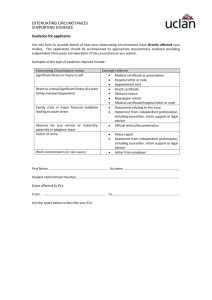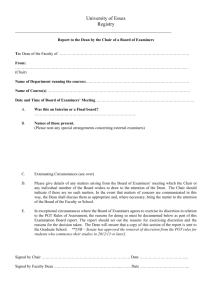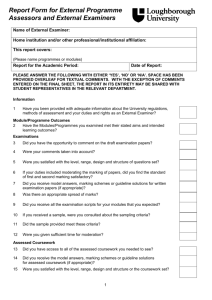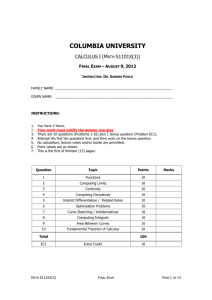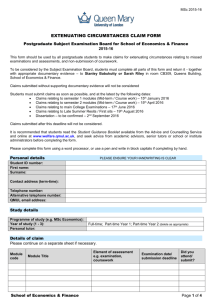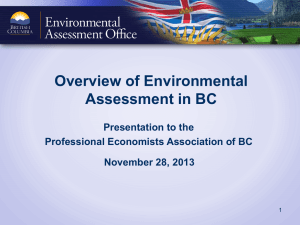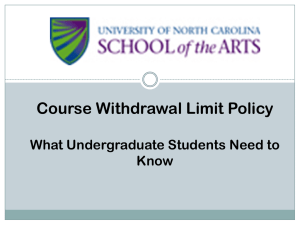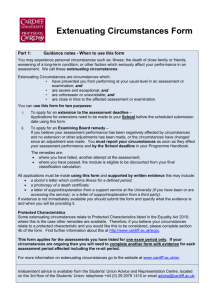Procedures for the Presentation of Extenuating Circumstances
advertisement
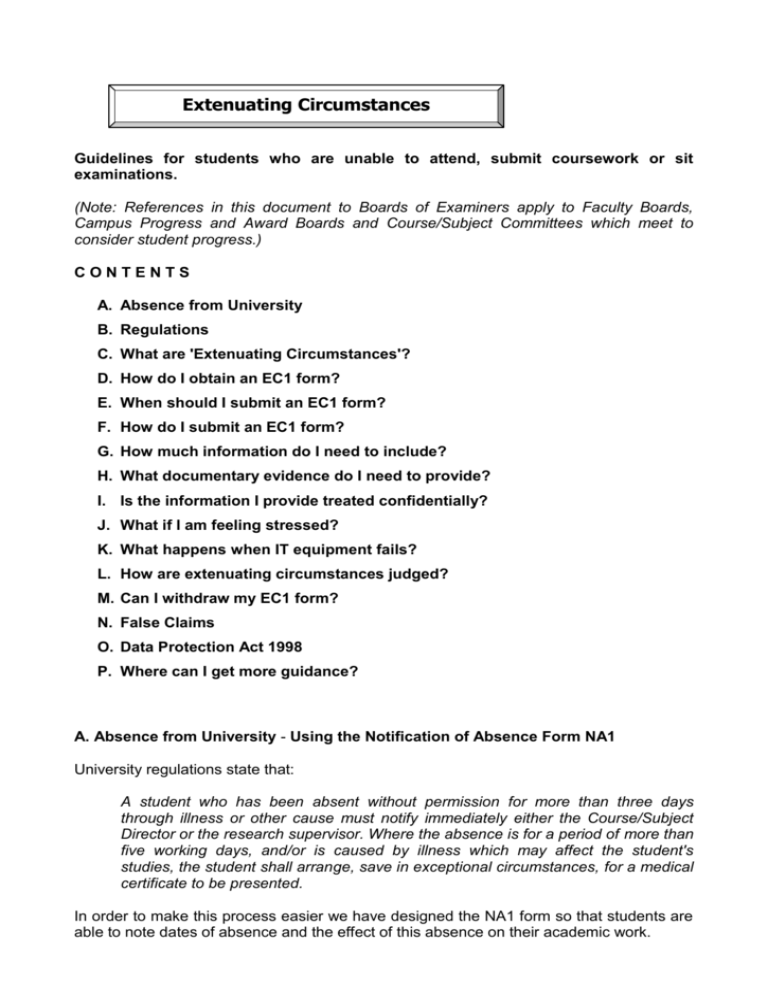
Extenuating Circumstances Guidelines for students who are unable to attend, submit coursework or sit examinations. (Note: References in this document to Boards of Examiners apply to Faculty Boards, Campus Progress and Award Boards and Course/Subject Committees which meet to consider student progress.) CONTENTS A. Absence from University B. Regulations C. What are 'Extenuating Circumstances'? D. How do I obtain an EC1 form? E. When should I submit an EC1 form? F. How do I submit an EC1 form? G. How much information do I need to include? H. What documentary evidence do I need to provide? I. Is the information I provide treated confidentially? J. What if I am feeling stressed? K. What happens when IT equipment fails? L. How are extenuating circumstances judged? M. Can I withdraw my EC1 form? N. False Claims O. Data Protection Act 1998 P. Where can I get more guidance? A. Absence from University - Using the Notification of Absence Form NA1 University regulations state that: A student who has been absent without permission for more than three days through illness or other cause must notify immediately either the Course/Subject Director or the research supervisor. Where the absence is for a period of more than five working days, and/or is caused by illness which may affect the student's studies, the student shall arrange, save in exceptional circumstances, for a medical certificate to be presented. In order to make this process easier we have designed the NA1 form so that students are able to note dates of absence and the effect of this absence on their academic work. We hope that you will not see this as just another piece of bureaucracy. Research shows that attendance is a key component in academic success and we hope that this form will make it easier for you to monitor your absence. We also hope that it will help academic staff to be aware of any problems you might be having as they occur and to offer you advice and help or refer you to another service in the University as appropriate. This form might be a crucial piece of evidence if your health or other circumstances interfere with being able to complete or submit assessed work, when a copy may authenticate a difficulty which arose before the assessment date but which nevertheless affected your performance. It is increasingly difficult to obtain medical evidence for illnesses which you can only report to your GP later and Boards of Examiners are unlikely to take such retrospective evidence seriously. It is, therefore, of great importance that you provide evidence of ill-health or other difficulty at the time that it occurs. The NA1 form and more detailed guidance notes are available on the Student Portal, portal.ulster.ac.uk, select Banner button, Personal Information. B. Regulations Governing Student Assessment in Coursework and Examination Save in exceptional circumstances: (a) (b) (i) written medical evidence, or evidence of compassionate circumstances, relevant to the performance of a candidate in a written examination must be presented to the Course/Subject Director, except in the Faculty of Computing and Engineering where forms should be submitted to School Offices and a receipt obtained, not later than five days following the examination; (ii) written medical evidence, or evidence of compassionate circumstances, relevant to the performance of a candidate in coursework must be presented to the Course/Subject Director, except in the Faculty of Computing and Engineering where forms should be submitted to School Offices and a receipt obtained, not later than five working days following the date on which the work was due to be submitted. Evidence of ill-health must be authenticated by the candidate’s medical adviser. Medical certificates should be forwarded directly to the Course/Subject Director, except in the Faculty of Computing and Engineering where forms should be submitted to School Offices and a receipt obtained. Self-certification will not be accepted. The term ‘exceptional circumstances’ will be given a restrictive interpretation. The Senate, through the relevant committee, shall determine exceptional circumstances which allow alternative forms of authentication of ill-health in respect of clause (b). Such circumstances may include an epidemic or pandemic. A candidate claiming exceptional circumstances in relation to the late submission of evidence under clause (a) must do so in writing. This will be considered under the Appeals procedures. 2 C. What are 'Extenuating Circumstances'? In a nutshell Extenuating circumstances refer to something unforeseeable or unavoidable e.g. you couldn't write because you suffered a broken arm just prior to an examination. They are normally circumstances beyond the student's control which either prevent the student from taking an examination(s) or submitting coursework, or which affect academic performance in coursework or examination(s). Extenuating circumstances will usually be health related or of a personal nature. Examples of extenuating circumstances that may be accepted by an Exam Board: (a) (b) (c) (d) (e) (f) (g) Illness in the run-up to an examination or coursework deadline, or during an examination Bereavement in the run-up to an examination or coursework deadline (normally a close relative i.e. parent, child, partner or sibling) Sudden illness or emergency in connection with a family member or dependent Civil disturbance (rioting, intimidation, bomb-scares, bus and rail disruption) Traumatic event (e.g. being assaulted, or witnessing an accident or assault) Extreme weather conditions preventing either study or travel Domestic upheaval (fire, burglary, eviction) What circumstances are NOT taken into account? It is not possible to list every circumstance that the Board of Examiners would reject. Unless there are extraordinary circumstances, general pressure of academic work is not taken to be circumstances beyond your control, as you are expected to plan your work schedule. Examples of extenuating circumstances that would not normally be accepted: (h) (i) (j) (k) (l) (m) (n) (o) Employment commitments limiting time available for study (although greater flexibility may be applicable to part-time students in full-time employment) Pressure of other academic work e.g. other coursework due around the same time Having to take a pre-arranged holiday Wedding preparations Sporting commitments (although exceptions might sometimes be made, e.g. if you were representing your country, or the University) Missing a bus Moving house Failure of IT systems, or inability to gain access to IT systems, when you have not taken adequate precautionary measures – e.g. failure to keep copies or save backup versions, or ill-judged reliance on friends’ or classmates’ equipment or help, or leaving it to the last minute to seek access to University facilities. In all such cases, these difficulties could have been foreseen and avoided at an earlier stage. NB These examples are not definitive, and are intended only as a guide. In all cases, the Board of Examiners has ultimate authority to use its discretion, taking into account the full circumstances of a particular case. A claim form (EC1) should be completed by a student affected by extenuating circumstances. 3 D. How do I obtain an EC1 form? The form is available from the Student Portal, portal.ulster.ac.uk, My Studies tab, Examinations and Assessment channel. The form is also available from a number of other sources. Your Course Handbook and/or Student Handbook will specify where else you can obtain a form but possible sources are the Faculty Office and the School Office. E. When should I submit an EC1 form? It is your responsibility to inform the Course/Subject Director about extenuating circumstances that affected your academic performance by completing an EC1 form. Although you may have previously discussed your difficulties with staff in your School, this does not in itself constitute the submission of extenuating circumstances. The form should be returned at the earliest opportunity and, save in exceptional circumstances, no later than 5 working days following the submission date of coursework or 5 days after the date of examination. If circumstances are such that you are going to be unable to submit an assignment on time, then you should complete an EC1form without delay. Faculties may require you to submit work done to date. If documentary evidence (see section H) is unavailable, the form should still be submitted by the due deadline with a note to say that this evidence will follow. Once the Board of Examiners has met, it is too late to submit an EC1 form. Information about how to appeal against the decision of the Board of Examiners is available from the Student Portal, portal.ulster.ac.uk. F. How do I submit an EC1 form? The completed form must be submitted to the Course/Subject Director, except in the Faculty of Computing and Engineering where forms should be submitted to School Offices and a receipt obtained. It may be sent by post if you are unable to attend the University. Evidence that is not immediately available should be forwarded as soon as possible. G. How much information do I need to include? The circumstances should be described clearly. The EC1 form should contain the essential information to enable an informed decision regarding the circumstances to be made. You should only include on the form details of the specific coursework or examinations that have been affected by illness, personal difficulties etc. Make sure you explain the impact these circumstances had on your performance (e.g. how long you were unable to attend due to illness). It is not the role of the Board of Examiners to try to work this out or to seek further information on your behalf. Try to make your submission clear and concise. You are also asked on the form to specify what outcome you would, within reason, consider desirable. This will normally be either a first sit in examination or class test, or an extension of time to submit coursework. There is no point in asking for additional marks to be awarded to compensate for your extenuating circumstances as marks can not be adjusted in this way. 4 You may find it helpful to discuss your application with your Course/Subject Director, Studies Advisor or another appropriate member of academic staff in addition to submitting your claim form. You will not have to disclose sensitive personal details if you prefer not to. Should you be reluctant to specify such details on the EC1 form, you should seek the advice of a University Counsellor or other suitable professional person. Great care is taken over the confidentiality of information provided by students and it is vital that you do not withhold evidence. H. What documentary evidence do I need to provide? It is your responsibility to supply the appropriate evidence to support your claim. This documentary evidence is normally required to accompany the EC1 form when it is submitted to the Course/Subject Director, except in the Faculty of Computing and Engineering where forms should be submitted to School Offices and a receipt obtained. You should attach a copy of any relevant Absence forms (NA1) which you have submitted at the time of the difficulty. Examples of appropriate evidence include: a medical certificate, a discharge letter from a hospital, a letter from a university counsellor, from the PSNI or a solicitor. There are exceptional cases where such evidence is inappropriate or unavailable, for example because your doctor does not provide certificates for minor illness. However, in all other cases, students will be expected to provide documentary evidence. Where it is reasonable to expect such evidence and that evidence is missing, it is unlikely that the application will be successful. A letter from your GP stating that you were seen on a particular date and you told him/her that you HAD BEEN ill will not normally be accepted by the Board of Examiners. If you were suffering from an illness for which you would not normally consult your GP, you might seek confirmation of your symptoms from the nurses in the University Health Centres that you were medically unfit to take the examination. If you are claiming a minor illness has affected work or caused you to miss a deadline then please note that an absence form should have been submitted at the time of your absence. A duplicate copy of the absence form should accompany your EC1. If you have been receiving treatment for a serious or long term medical condition which you believe has seriously affected your work over a prolonged period, you must submit appropriate evidence. Please seek guidance from your Course/Subject Director if you are in doubt about what would be appropriate evidence. I. Is the information I provide treated confidentially? Meetings are absolutely confidential, and members have wide experience of the full range of problems that students can encounter. The minutes of the Board of Examiners will only record whether or not extenuating circumstances were considered and accepted/rejected – the nature of the circumstances will not be minuted. While there may be some factors which you would prefer not to commit to paper, you should reveal these by means of a private meeting with your Adviser of Studies or Course Director. If satisfied, the Adviser of Studies or Course Director may then report (without 5 full disclosure) that in their professional opinion you have legitimate extenuating circumstances. However, the onus is always on you to specify the degree of detail that you wish to have disclosed, and this will need to be sufficient to satisfy the Board of Examiners. J. What happens if I am feeling stressed? A certain degree of stress, anxiety and pre-examination nerves, and associated psychosomatic symptoms, are very common in the run-up to examinations. Coping with this pressure is part and parcel of the student experience. Presented with evidence of pre-examination stress, a Board of Examiners will be entitled to take into account: the extent to which this stress prevented you from performing to your full potential; the extent to which this stress is of a different nature to that experienced by all students at examination time; the extent to which this stress was self-inflicted, i.e. a consequence of failure to work steadily throughout the year; the extent to which this stress is likely to recur. If you experience pre-examination stress, or have a disability that might impair your performance, you are encouraged to consult Student Support Services. K. What happens when IT equipment fails? There are some circumstances when failure of IT equipment will not be taken into account. The following list is not exhaustive:Failure affecting a single workstation in a lab or a single failure in a dedicated lab; Failure of your personal computer or network link; Failure to access IT equipment and/or printing facilities in a timely manner; University's systems incompatible with home computer; It would be expected that you should check that work brought in from home could be printed at the University well before assessment deadline. Regarding the theft of a home computer, students are expected to make a back up copy of all their work on a floppy disk. This should be stored separately from the computer. A claim submitted on this basis would be considered at the discretion of the Board of Examiners. L. How are extenuating circumstances judged? All claims will be judged at the discretion of the Board of Examiners. The University seeks to determine whether, and to what extent, extenuating circumstances have affected your academic performance, and what action, if any, can be taken. In assessing the significance of extenuating circumstances the University will normally take into account: the severity of the problem and the length of time involved; any supporting documentary evidence; whether it is possible to gauge the effect of the extenuating circumstances upon academic performance; 6 M. Can I withdraw my EC1 form? An EC1 form cannot normally be withdrawn after receiving a mark for the work in question. However, if you have submitted an EC1 form in advance of an assessment and your circumstances improve you may withdraw the EC1 form before it is too late as follows: by submitting the coursework within the deadline, along with an accompanying statement that you wish to withdraw the EC1 form, and/or; by attempting the examination after submitting a statement to the effect that you wish to withdraw the EC1 form. This statement can only be submitted to the Course Director, Adviser of Studies or School office before the start of the examination, and must be witnessed and signed off to this effect, with the precise time recorded. N. False Claims You should note that submitting a false claim could be regarded as an attempt to gain unfair advantage and could constitute a breach of discipline under the University’s disciplinary procedures. O. Data Protection Act 1998 By submitting an extenuating circumstances form you are agreeing to the University holding this personal data for the purposes of processing your claim. The University will hold this data in accordance with its notification under the 1998 Data Protection Act. P. Where can I get more guidance? If after having read these notes you feel you need more help in putting forward your extenuating circumstances, you should contact your Course/Subject Director, your Studies Adviser, Student Support or Students Union. Useful websites are: http://portal.ulster.ac.uk http://www.studentsupport.ulster.ac.uk/ http://www.uusu.org EC1 Procedures for Students Dec10 7
